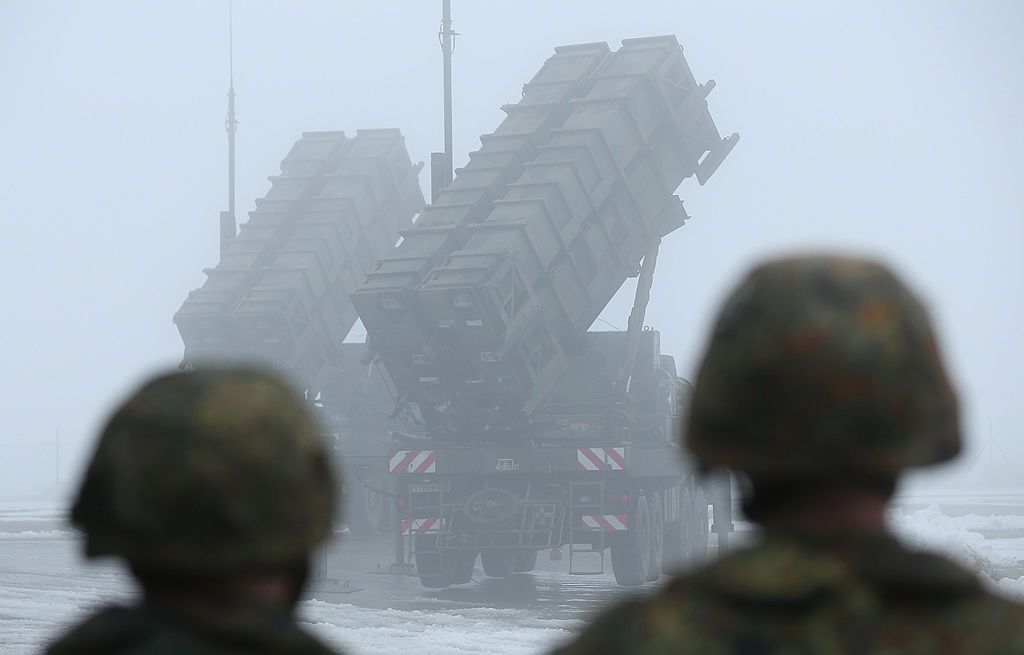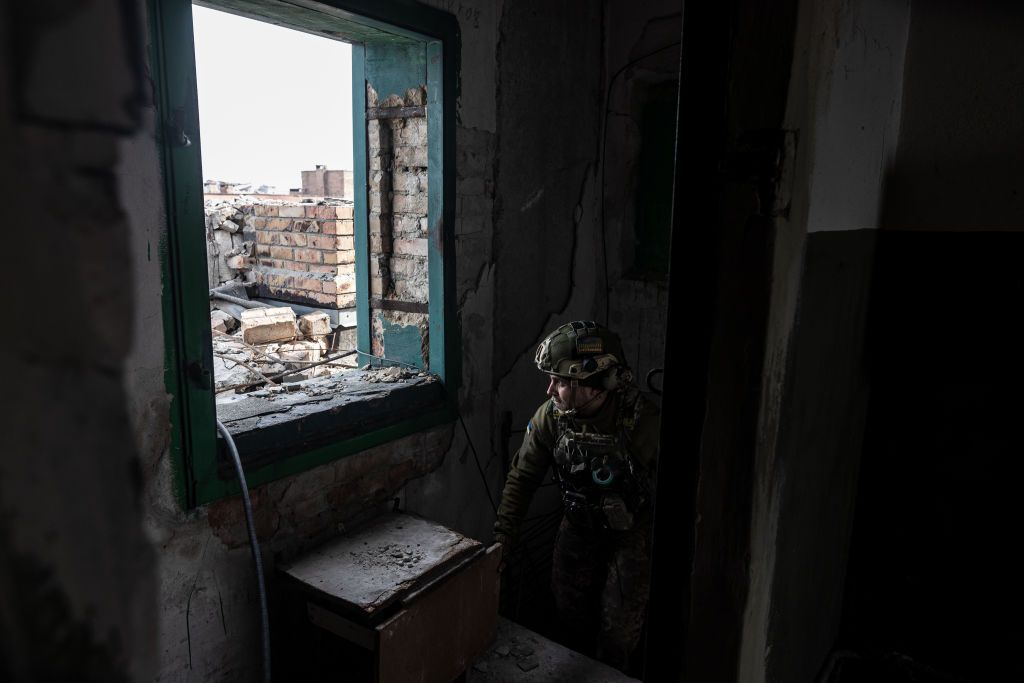Ukraine war latest: Preliminary findings allege Russian missile fell in Poland in December

Key developments on May 10:
- Journalists geolocate 223 military facilities in Russian-occupied Crimea
- Kremlin claims no knowledge of Wagner boss' lack of ammunition complaint
- Kuleba says Ukraine may launch more than one counteroffensive
- Russia's Victory Day parade shows material, logistical issues
- Russian Kh-55 missile likely fell in Poland in December
The military object, found in April near the Polish town of Bydgoszcz, could be a Russian Kh-55 cruise missile launched from Belarus during a mass attack against Ukraine, Polish radio station RMF FM reported on May 10.
According to preliminary findings of the Air Force Institute of Technology, cited by RMF FM, the missile likely flew to Poland, crossing the country's eastern border. The Polish army doesn't have Kh-55 rockets and systems that could launch them in its arsenal.
In mid-December last year, Russia launched one of its now regular mass missile strikes against Ukraine, using aircraft stationed in Belarus.
When a Russian Su-34 tactical bomber got close to the NATO airspace, and its planes took off, the Polish military recorded an object flying to Poland from Belarus, the RMF FM wrote.
According to the media outlet, Polish services tried to track the object but lost sight of it near Bydgoszcz.
The RMF FM also wrote that the Polish military - contrary to its duties - hadn't immediately informed the prosecutor's office about the incident. The Polish personnel reportedly tried to find the object right after it fell in December, but the search was stopped due to bad weather conditions.
The discovery of an unidentified military object in a forest near Bydgoszcz, northern Poland, was first reported on April 27. Then, the RMF FM alleged, citing the former commander of GROM Polish special forces, that those were debris of an air-to-surface missile possibly belonging to the Polish army.
Journalists track down Russian military facilities in occupied Crimea
Krym Realii media outlet journalists published a map with geolocations of 223 active, temporary, and preserved military facilities in Russian-occupied Crimea.
The points on the map are divided into 10 categories, including Russia's Black Sea Fleet warehouses for weapons, ammunition, and other military equipment, air bases and airfields, radio and communication stations, and air defense and missile forces.
Other categories include border guard posts, internal troops, scouts, and other units of Russia's Armed Forces, fuel for troops, training grounds, military facilities with unknown purposes, and chemical and biological defense forces.
Russia occupied Crimea in 2014, which effectively began Russia's war against Ukraine, now in its 10th year.
Since the start of the full-scale war, Russia has been using Crimea to launch missiles against mainland Ukraine and as a logistic route to transfer equipment to the southern battlefield.
Wagner boss' rant falls on deaf ear
Kremlin spokesperson Dmitry Peskov said Moscow has not yet seen the May 9 video posted by Wagner mercenary group boss Yevgeny Prigozhin, in which he claims that Wagner has still not been given the ammunition requested from Russia's defense ministry.
"You know what we were doing, yesterday," said Peskov in a press briefing on May 10 as cited by Russian media.
In the video, posted by Prigozhin's press service, the Wagner boss also claimed that Russian units of the 72nd Separate Motorized Rifle Brigade had abandoned positions near Bakhmut, later corroborated by a report from Ukraine's Third Assault Brigade who had claimed to advance in the area.
The internal conflict between Wagner mercenaries and the Russian Defense Ministry has escalated dramatically over the past week.
On May 5, Prigozhin recorded a video in front of what he claimed to be the bodies of dozens of Wagner mercenaries supposedly killed that day around Bakhmut in Donetsk Oblast.
In an explicit rant, the Wagner boss directly blamed Russian Defense Minister Sergei Shoigu and Chief of the General Staff Valery Gerasimov for the fighters' deaths, saying that Wagner was being deprived of the ammunition to continue the assault on Bakhmut.
Prigozhin later recorded several other videos publicly attacking the Russian military command.
On May 10, Prigozhin had to backtrack his previous comments in which he said "our soldiers are being killed, yet the happy grandpa thinks everything is good."
Bakhmut has been the epicenter of fighting between Ukrainian and Russian forces. The Wagner mercenaries have served as the primary force in Russia's attempts to expand its control over Donetsk Oblast, more than half of which Russia currently occupies.
Ukraine still holds western parts of the city. Ukrainian Ground Force Commander, Oleksandr Syrskyi, said on May 10 Ukrainian troops gained several kilometers in some parts of the city.
Kuleba tones down counteroffensive expectation
In an interview with the German newspaper Bild, Foreign Minister Dmytro Kuleba urged not to think about Ukraine's expected counteroffensive as the country's last attempt "because we don't know what will come out of it."
"If we succeed in liberating our territories with this counteroffensive, you can say it was the last one, but if not, that means we have to prepare for the next counteroffensive," said Kuleba.
According to the Washington Post, top Ukrainian officials are afraid the much-anticipated upcoming Ukrainian offensive may not live up to expectations.
"The expectation from our counteroffensive campaign is overestimated in the world," Defense Minister Oleksii Reznikov told the Washington Post. "Most people are … waiting for something huge," he said, which could lead to "emotional disappointment."
Meanwhile, Czech President Petr Pavel said his country would provide Ukraine with two more Kub mobile surface-to-air missile systems.
Russia's underwhelming Victory Day parade shows equipment issues
The May 9 Victory Day parade in Moscow's Red Square highlighted the equipment and strategic communications challenges the Russian military has faced during its full-scale invasion of Ukraine, according to the U.K. Defense Ministry.
Over 8,000 military personnel reportedly participated in the parade, but most were auxiliaries, paramilitary forces, and military academy cadets, the ministry wrote in its latest intelligence update.
"The only personnel from deployable formations of regular forces were contingents of Railway Troops and military police."
An old T-34, the Soviet main battle tank during World War II, was the only tank on display, which is a substantial downsize from the usual number of vehicles shown at the event held annually to commemorate Nazi Germany's defeat in 1945.
"Despite heavy losses in Ukraine, Russia could have fielded more armored vehicles," reads the ministry's update.
"The authorities likely refrained from doing so because they want to avoid domestic criticism about prioritizing parades over combat operations."
Earlier, six Russian regions, Russian-occupied Crimea, and 21 cities had canceled their parades due to security concerns.
In May 2022, large-scale parades were held in Moscow and other cities in Russia despite the full-scale war raging in Ukraine.













